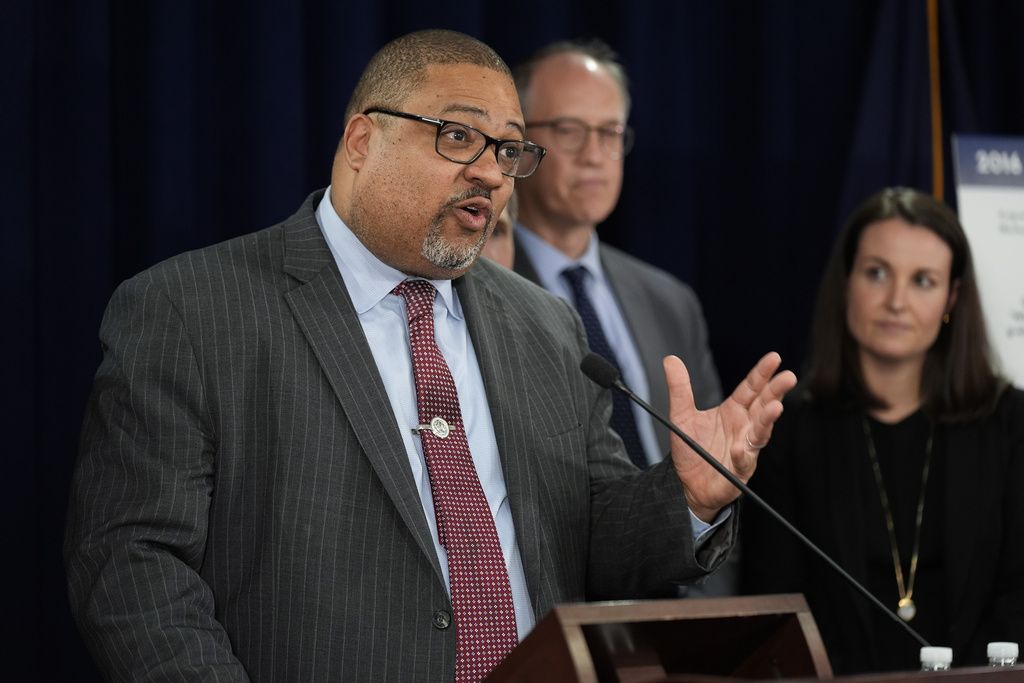
Republicans and Democrats have offered up dueling narratives about Manhattan District Attorney Alvin Bragg and his decision to prosecute former President Donald Trump for falsifying business records.
Bragg on Thursday became the first prosecutor in U.S. history to convict a former president, capping off a risky yearlong approach to a complicated case.

Critics claim he intentionally targeted Trump not because of the crimes committed but because he disagreed with his politics and wanted to prevent him from seeking a second term.
Supporters insist Bragg has been open from the start about following the paper trail in the hush money case and that his decision to indict the presumptive 2024 Republican presidential nominee was entirely evidence-based.
Bragg arguably filed the weakest of the four indictments against Trump but was the first prosecutor who managed to get their case over the finish line.
Bragg, a Democrat, ran for office as someone ready to hold Trump and other powerful New Yorkers accountable.
The incumbent, Cyrus Vance Jr., had been heavily criticized for failing to bring charges against influential heavyweights like Harvey Weinstein and two of Trump’s children, Ivanka Trump and Donald Trump Jr.
While campaigning, Bragg made a point of highlighting his experience investigating the Trump family.
“I have investigated Trump and his children and held them accountable for their misconduct with the Trump Foundation,” he said during a 2020 candidate forum.
He added, “It is a fact that I have sued Trump more than a hundred times. I can’t change that fact, nor would I. That was important work. That’s separate from anything that the DA’s office may be looking at now.”
Bragg beat out Vance but also faced criticism for failing to indict the former president immediately. Prosecutors in his office started to quit and speak out publicly, forcing Bragg’s hand to pursue a case that seemed like a legal stretch at the time.
Bragg used a Russian nesting doll structure to go after Trump, tucking crimes inside other crimes, which appeared risky to legal analysts but worked in the end.
Trump was ultimately found guilty on 34 felony counts of falsifying business records to conceal a hush money payment to a porn star during his 2016 presidential campaign.
“I did my job, and we did our job,” Bragg said at a news conference after the verdict when asked about the criticism he received about his handling of the investigation and the case. “There are many voices out there, but the only voice that matters is the voice of the jury, and the jury has spoken.”
Trump, who has called himself a political prisoner and vowed to appeal the verdict, argued that he has been unfairly targeted and is being used to further Bragg’s political aspirations. He has accused billionaire liberal donor George Soros of financing Bragg’s 2021 election campaign and claimed Bragg “campaigned on the fact that he would get President Trump.”
“This is a guy campaigning,” Trump said. “You want to get President Trump at any cost and this before he knew anything about me, didn’t know a thing about me. He was campaigning.”
House Speaker Mike Johnson (R-LA) called the guilty verdict a “shameful day in American history” and slammed the trial as “a purely political exercise, not a legal one.”
Republicans on the House Judiciary Committee’s select subcommittee on the weaponization of the federal government asked Bragg and prosecutor Matthew Colangelo on Friday to testify before them on June 13. The hearing “will examine the unprecedented political prosecution” of Trump.
Sen. Susan Collins (R-ME), one of seven Senate Republicans who voted to convict Trump on an impeachment charge following the 2021 attack on the Capitol, also came to the former president’s defense.
She criticized the “political underpinnings” of Bragg’s decision to go after Trump and said it could “further blur the lines between the judicial system and the electoral system.”
“The district attorney, who campaigned on a promise to prosecute Donald Trump, brought these charges precisely because of who the defendant was rather than because of any specified criminal conduct,” she said in a statement.
Sen. Lindsey Graham (R-SC) argued that the trial undermined trust in the justice system and called Bragg “a political hack prosecutor” who “manufactured charges in one of the most liberal legal venues in the country.”
Gov. Ron DeSantis (R-FL) put it in the simplest terms: “If the defendant were not Donald Trump, this case would never have been brought.”
Supporters of Bragg disagree and point to comments he repeatedly made about not prejudging the case before seeing the facts.
When asked during a Hot 97 interview about Trump, Bragg said he wouldn’t rush a case against Trump.
“So I’m being careful not so much for running for office, but because every case does have to be judged on its facts, and I don’t know all the facts, right?” Bragg said. “And so I’ve been doing this for 20-plus years, so I want to be fair. But with that said, there’s a lot that’s out there publicly.”
John Nichols, author of It’s OK to Be Angry About Capitalism, also pushed back on Trump’s claims Bragg targeted him.
CLICK HERE FOR MORE FROM THE WASHINGTON EXAMINER
“Bragg never suggested that he would cut corners, or be unfair when it came to bringing the felony case that would ultimately make Trump the first former president in US history to be a convicted felon,” he said. “What he promised was that he would not blink. He would not shy away from doing the job he was assigned by the electorate, and that he was duty-bound under the law to perform.
He added, “Bragg kept the promise that he made as a candidate to pursue equal justice under the law. And he did so with appropriate focus and determination.”





